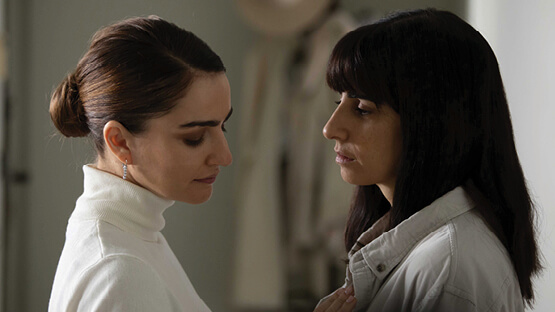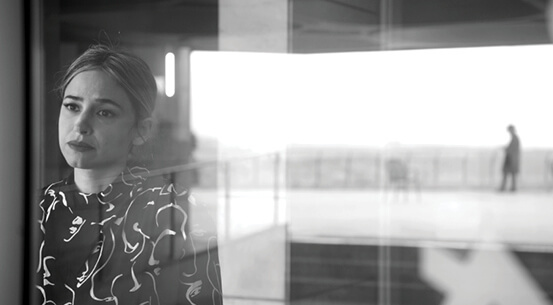In two daring new films from Israel, life and art are even messier than politics
‘The Other Widow’ and ‘The Good Person’ are playing at the Israel Film Center Festival

Dana Ivgy and Ania Buckstein in The Other Widow. Photo by Marlene Myerson JCC Manhattan
Sharon is a film producer who one day finds herself sleeping on the floor of her office on a pile of her clothes. Ella is a costume designer mending the ripped Chanel dress of her lover’s widow. Neither are OK, but both are coming to understand something fundamental: Life is messy — and an artistic life in Israel all the more so.
Sharon (Moran Rosenblatt), is the central character of Eitan Anner’s The Good Person. The title is not alluding to her altruism, it’s a blink-and-you’ll-miss-it reference to Bertolt Brecht’s play The Good Person of Szechwan, concerning the moral compromise of a sex worker tested by the Gods.
Sharon doesn’t do sex work, but, brought low by debts and her estrangement from her husband and patron, she prostitutes her feminist principles for around 2 million shekels, agreeing to produce a film for Rabbi Uzi Silver (Rami Heuberger), a onetime actor who left the business to become Haredi.
“I heard he’s very extreme,” Sharon tells her colleague Ofer.
“Who isn’t a little extreme nowadays?” he counters.
This may or may not be a subtle wink at Israel’s charged political situation, but taking the job with Silver is fraught in its own way. He won’t shake her hand or look her in the eye and has conditions that may well be called an exclusion rider. He will play King Saul in a script based on I Samuel. Leah will play the witch of Endor. They will shoot in Jerusalem and the crew will be only men.

Under normal circumstances, Sharon, who built her producing career on championing women and telling topical stories, would say no. But then, as she tells her line producer, “this isn’t a film, it’s a robbery” — she intends to use pocket most of the film’s budget to clear her debts and make the work she believes in.
Anner shoots this murky parable in black and white, with some scenes of the film-within-a-film breaking out in occasional color. In these moments we see Silver and Leah return from their self-imposed exile through performance. In the end, though, Silver jeopardizes Sharon’s plan, trying to save an intimate moment with his wife from public consumption. Sharon fights to keep the scene in — knowing that the integrity of the film depends on it. The question of who is selling out is suddenly complicated, if not reversed.
The Good Person, like Brecht’s play, defers to the audience, letting us decide what compromises are acceptable and if art or intimacy matters more. But in a film that runs under 90 minutes, the big questions feel slight, not examined as fully as they could be. Much of Sharon and Silver’s power struggles happen offscreen; at a moment ripe for conflict, Sharon is taken out of commission by a fainting spell.
Possible concussions and chaotic lives also figure into Maayan Rypp’s The Other Widow, which focuses on Ella (Dana Ivgy), a costume designer working on an adaptation of Medea. Only, in the version, Ella is not the vengeful filicidal mother, but the other woman who inspired her wrath.
Ella is rudderless with grief after the sudden death of the Medea adapter Assaf. Finding no support from the people in her play, she returns to Assaf’s house throughout the week of the shiva, finding an unconditional acceptance among the bereaved and befriending Assaf’s widow. Serving tea and helping Assaf’s mother, she’s able to prove useful. At home, she floods her apartment in a dress wired with tubes she cries into (Medea’s director rejects it).
Ella’s dilemma, only feeling at home in the home she wrecked, throws a spotlight on the limits of knowing a person. She knows a different, creative side of Assaf than his widow, Natasha (Ania Buckstein) — but then, they shared a life Ella could only guess at, even if she knows where the tea bags are kept in their house.
For this reformed theater person, The Other Widow, also exemplifies the ways an artistic family is not always a replacement for a conventional one. (I may have done a spit take when a mourner introduced himself to the bereaved as having played “Mr. Wisdom” in Conversations from a Volcano’s Stomach.)
The Other Widow would seem to side with The Good Person’s Rabbi Silver, showing Ella’s most affecting act of creation offstage: a private performance as uncompromising as it is fulfilling. We shouldn’t be watching, but it’s an indiscretion art allows.
These films are playing as part of The Israel Film Center Festival. More information on streaming and in-person tickets can be found here.

















